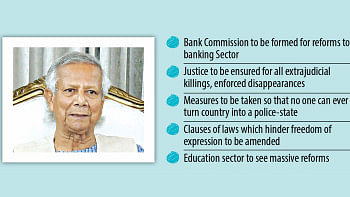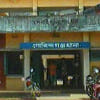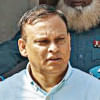Dr Yunus’s address and the path forward

In a much-awaited address to the nation, the chief adviser to the interim government, Dr Muhammad Yunus, delivered a timely, thoughtful, and comprehensive message to the citizens. He emphasised the need to implement various reforms to institutionalise democracy in the country, attending to the most pressing demands of our people. However, we would like to remind the interim government that it has not one but two urgent tasks at hand. The first is to administer the country in these turbulent times and, simultaneously, to pursue reforms—both of which together form a mammoth task.
Given the present state of the nation, the number of reforms needed may seem endless. However, pursuing all of them is neither realistic nor achievable in the short to medium term. Nevertheless, the chief adviser mentioned that his administration has planned wide-ranging reforms that resonate with the demands of the student-led mass movement that brought down the autocratic government of Sheikh Hasina. He further stated that these reforms are essential to prevent a return to being a police state, which would be a devastating outcome given the terrible suppression that people endured for 15 years and the sacrifices made by so many to end fascistic rule.
Dr Yunus also mentioned the need to form a police commission to overhaul law enforcement, a bank commission to reform the financial sector, and to conduct fair investigations into the violence that occurred in recent times. He also called for comprehensive reforms in education, the empowerment of local government bodies, and many other initiatives including taking action to ensure press freedom. The government's commitment to ensuring justice for all the extrajudicial killings and enforced disappearances—both anathema to any civilised society—is also praiseworthy. We will, of course, have to wait to see results. Meanwhile, we will urge the government to undertake institutional reforms that can safeguard citizens from such egregious crimes in the future as well.
Dr Yunus mentioned that the issue of elections was a political decision, and that he would leave it up to the people. Here, we would like to commend him for reminding the nation where the power truly lies—with the people. He said that the advisers of the interim government would hold dialogue with political parties to determine how decisions regarding the holding of elections would be made. He also expressed a desire to involve all stakeholders in discussions about the interim government's tenure. But he did not make it clear how that could be achieved. Here, we believe the interim government needs to form a comprehensive framework for communicating with all stakeholders in society.
In his address, Dr Yunus also invited everyone to come forward and suggest guidelines to help the government gather their input. Therein lies the opportunity for civic engagement. Moving forward, we hope that the people will work together and help in ongoing efforts to ensure that this opportunity for reforming the nation is not squandered again.


 For all latest news, follow The Daily Star's Google News channel.
For all latest news, follow The Daily Star's Google News channel. 








Comments